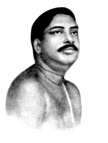Anukulchandra, Thakur

Anukulchandra, Thakur (1888-1969) Hindu devotee, physician and founder of the satsanga Ashram (hermitage), was born on 14 September 1888 at Hemayetpur in the district of pabna. His father was Shibchandra Chakraborty, a contractor, and his mother, Manomohini Devi.
Anukulchandra studied up to Class IX in Pabna Institution and then went to Naihati High School, West Bengal for further studies. He got a diploma in Homeopathy from Calcutta National Medical School and returned to his village to practice. Anukulchandra believed that ill health was not only physical, but also mental and psychological. Accordingly, he placed considerable emphasis on the treatment of mental diseases as well.
Anukulchandra was initiated into devotional ways by his mother. This led to his forming a kirtan party and performing kirtan. Sometimes during a performance, he would go into a trance. His utterances during these trances were later collected and published in a book titled Punyapunthi. It was from this period that he started being addressed as ‘Thakur’.
Anukulchandra set up a Satsanga Ashram at Pabna for fostering spiritual development. The four ideals of Satsanga are education, agriculture, industry and good marriage. He also set up a school, a charitable hospital, an engineering workshop, a publishing house, a printing press. The Satsanga still operates in both Bangladesh and West Bengal. In Bangladesh, it has offices in several places, including Dhaka and Chittagong.
In 1946 Anukulchandra went to Deoghar in Bihar and set up an ashram there on the model of Satsanga. He did not return to Pabna after the partition of India, but continued to remain in Deoghar where he died on 26 January 1969.
Anukulchandra was a prolific writer. Noted among his 94 books (82 in Bangali and 12 in English) are Punyapunthi, Anushruti (6 volumes), Chalar Sathi, Shashvati (3 volumes), Pritibinayak (2 volumes). [Paresh Chandra Mandal]
